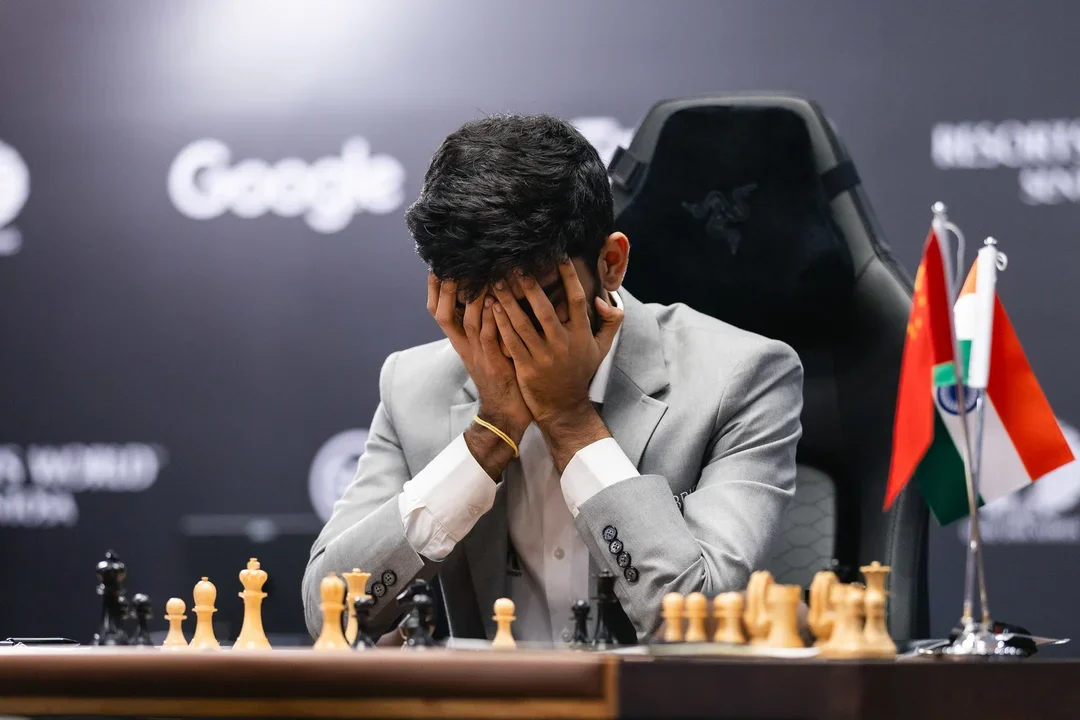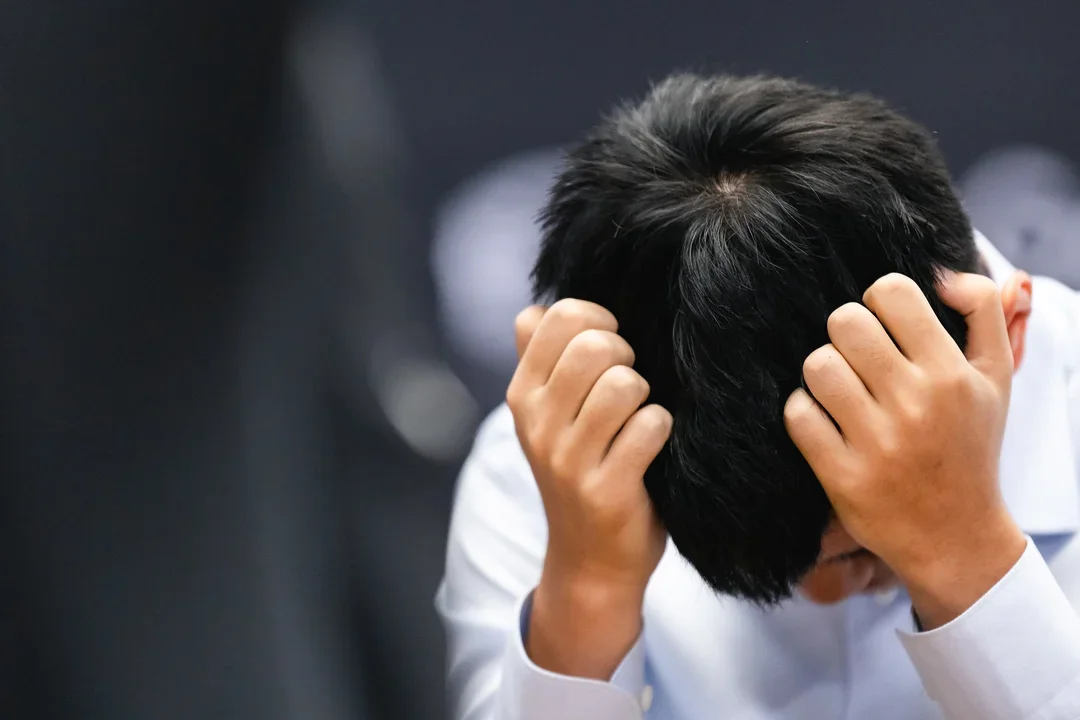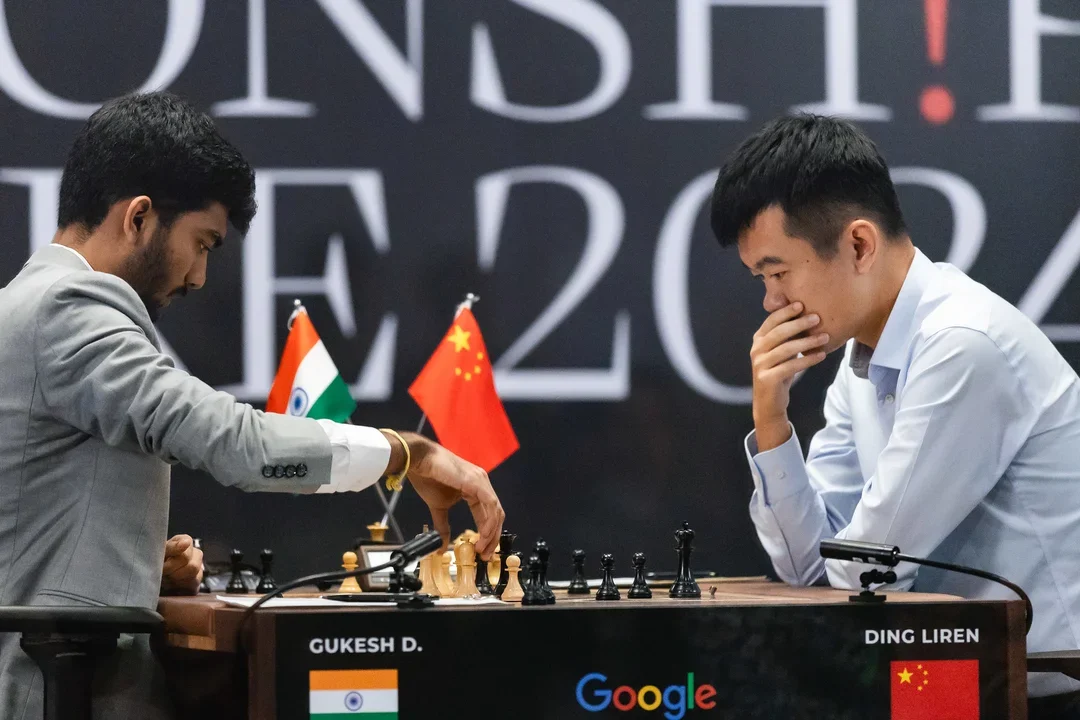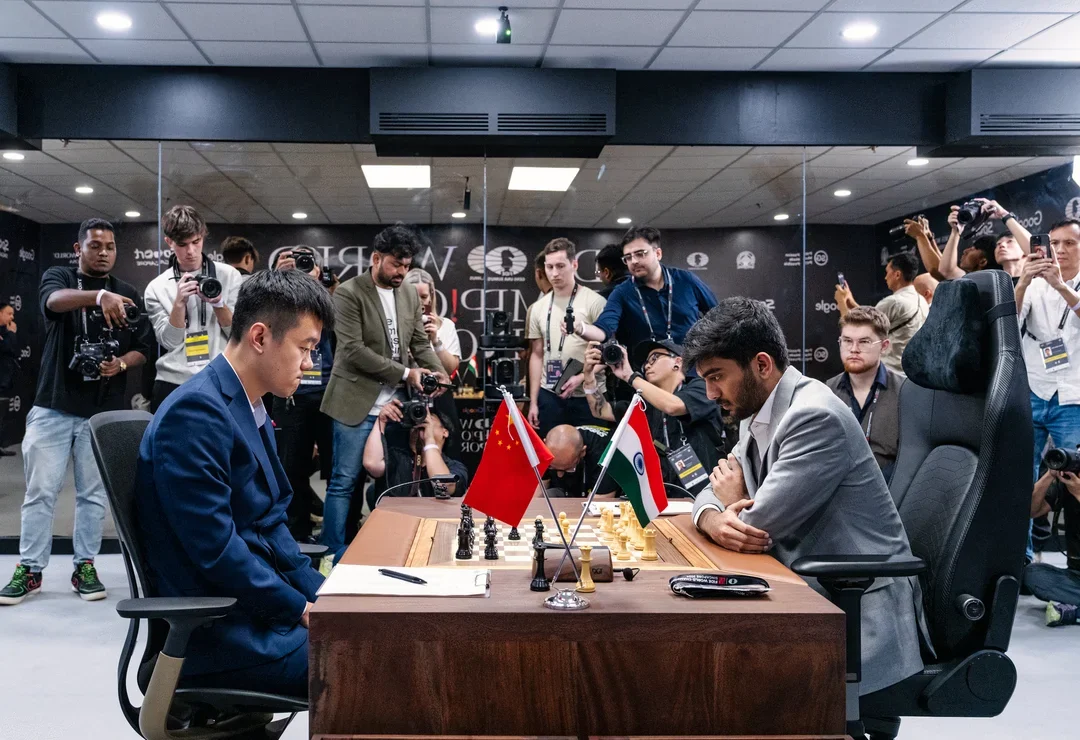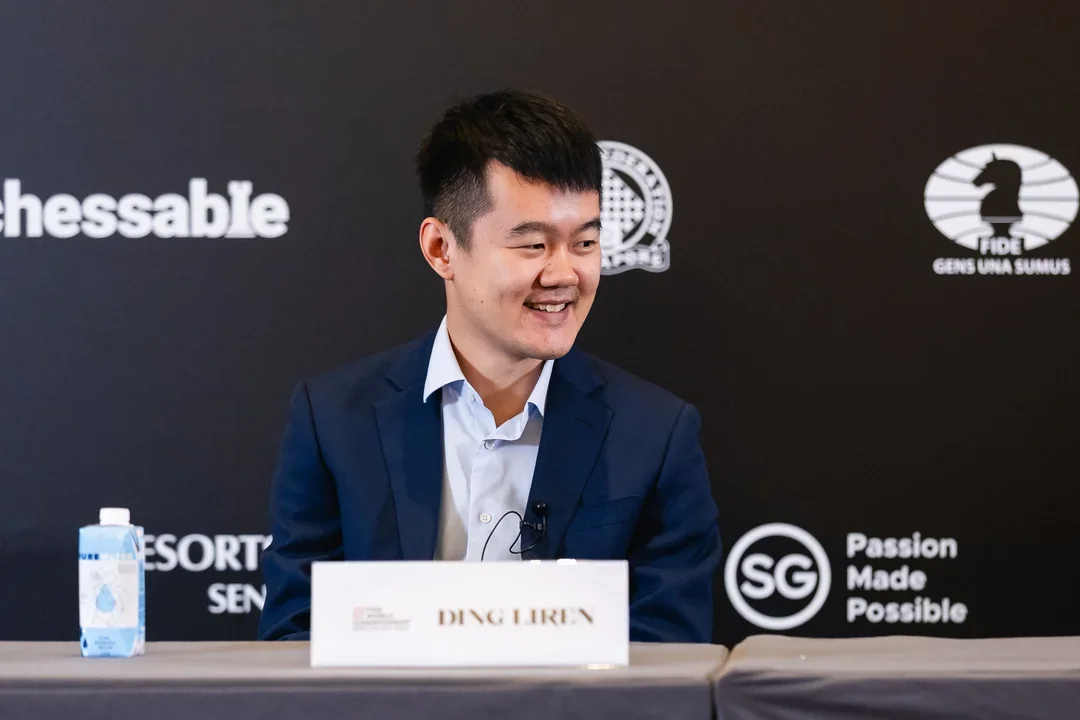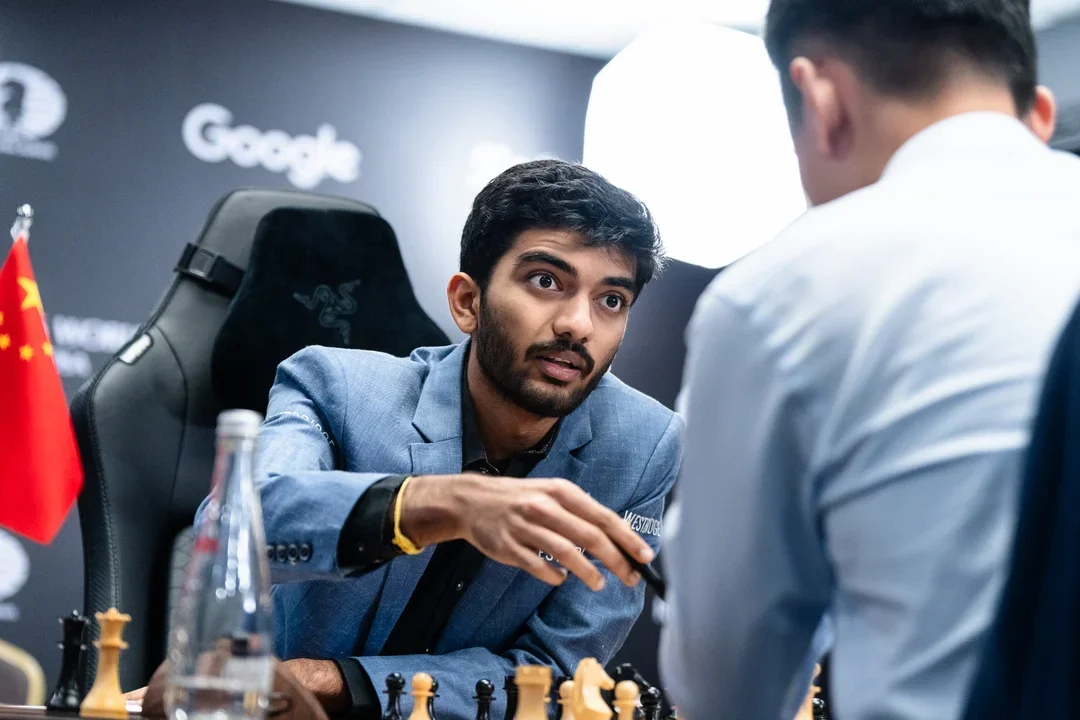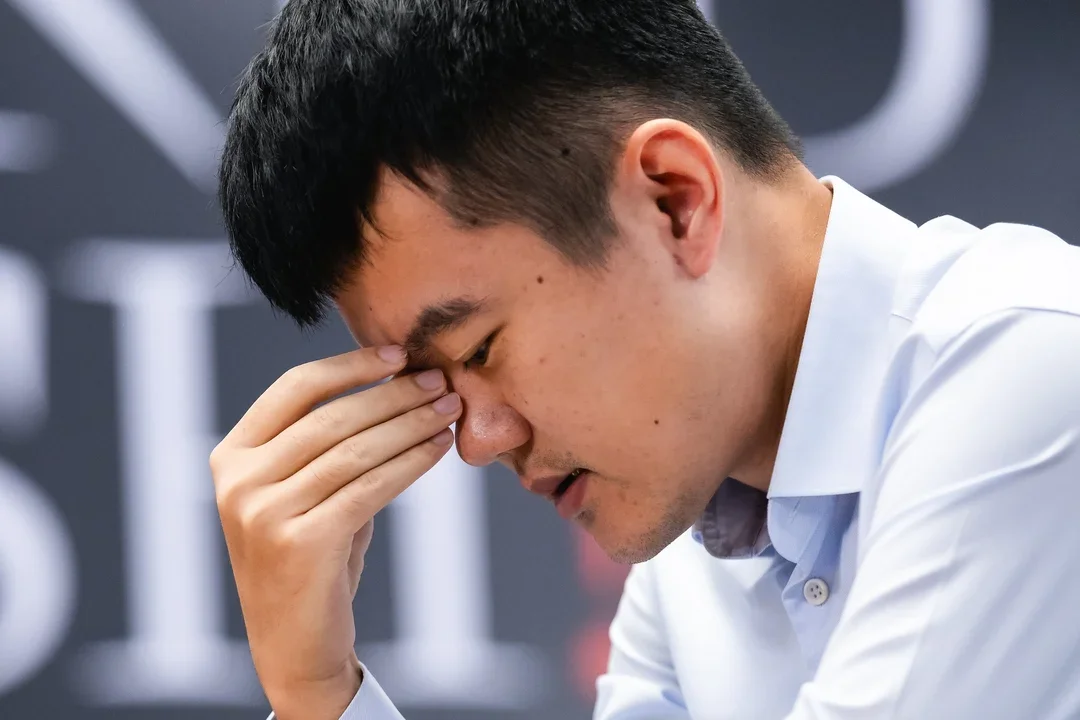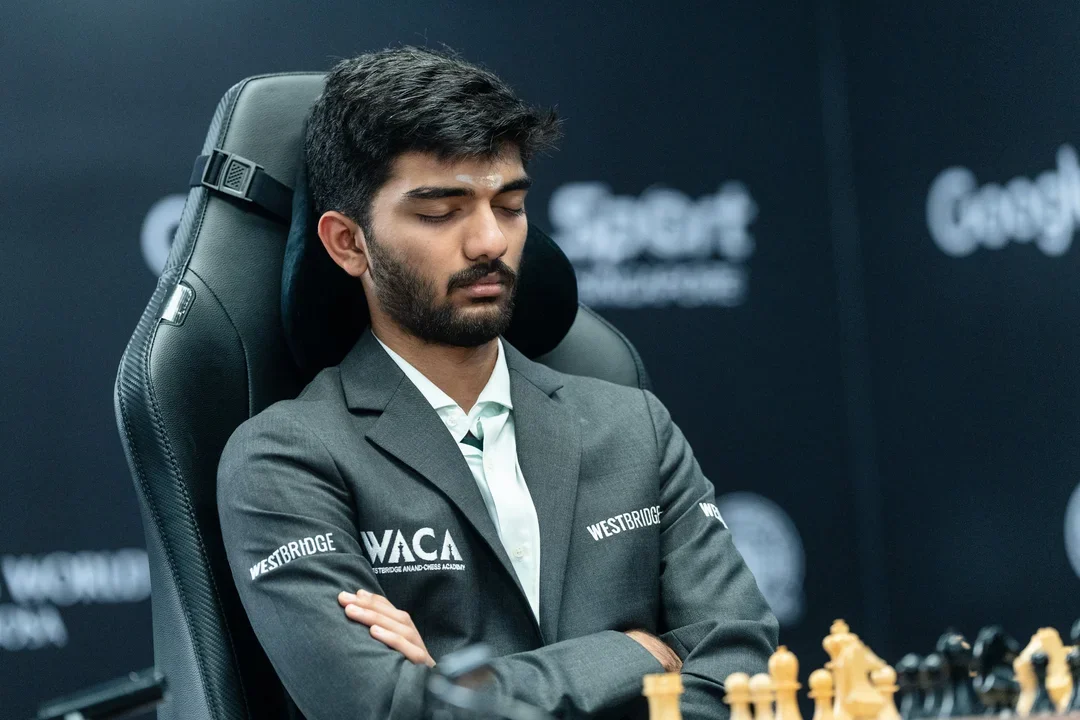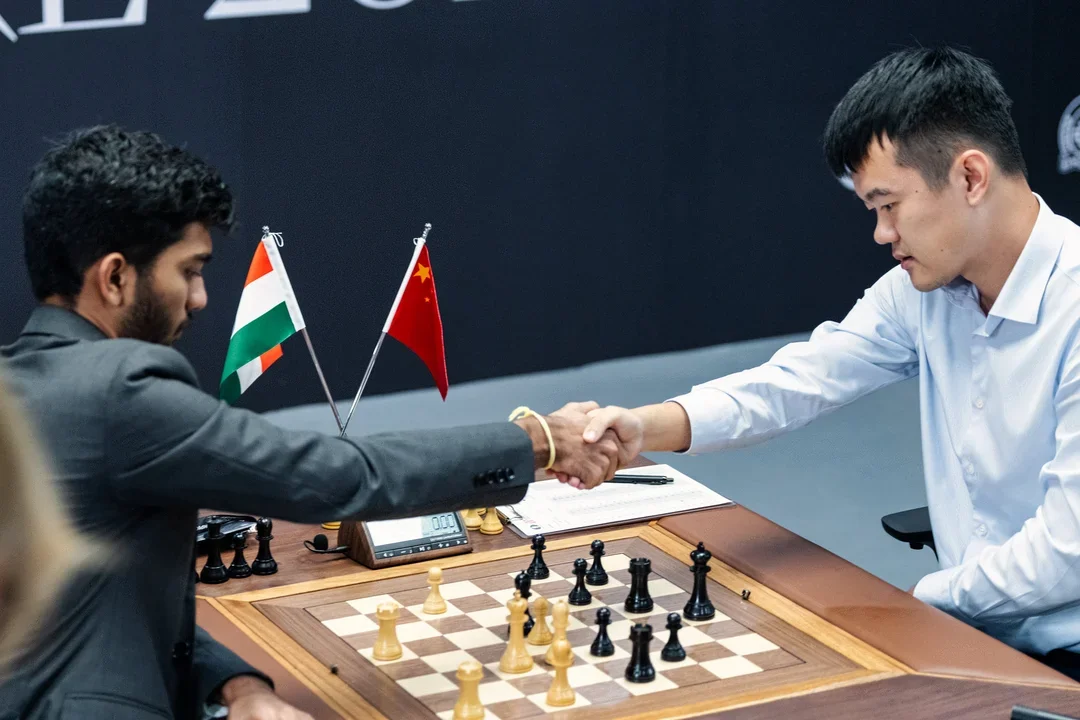Entering the first rest day in Singapore, GMs Ding Liren and Gukesh D are tied in the 2024 FIDE World Chess Championship at 1½ – 1½. Far from the slow start that some expected (and even further from the one-sided match between the rising Gukesh and trailing Ding that many others predicted), both players have shown ample fighting spirit and each already has a win to their name.
For comparison, there were only two decisive games total out of each of the 12-game match 2012 match between GMs Vladimir Kramnik and Vishwanathan Anand and the 12-game 2016 match between GMs Magnus Carlsen and Sergey Karjakin. Plus, the 2018 match between Carlsen and GM Fabiano Caruana saw zero decisive games before tiebreakers.
On the other hand, Ding and GM Ian Nepomniachtchi each put up three wins in the 14-game classical portion before Ding's tiebreakers victory in last year's match. With 11 more games to go this year, Ding and Gukesh are on pace to put up even a higher percentage of decisive games.
Extrapolation aside, both players have shown a willingness to take risks in their preparation and approach to the match as well as in their over-the-board decision making. Gukesh has already played two different opening moves with the white pieces, while Ding's reply to Gukesh's king's pawn opening in round one (a French Defense), seemed to be more of a psychological surprise weapon than a plan he will return to.
Likewise, Gukesh's queen's pawn opening in round three netted him a victory, but it was in a relatively off-beat variation of a Carlsbad structure that, time usage aside, Ding seemed to make good sense of. The defending champion even had an advantage out of the opening, despite clearly being caught off-guard by the variation. In other words, it's hard to say much about what to expect from the next few games as each player still seems to be "testing the waters" with their approaches so far. Perhaps they will continue giving each other pop quizzes in rare lines, but it's equally likely that one or both of the players has a "Plan A" they hope to return to multiple times during the match, and that neither wanted to reveal what it was in an early round.
In game one, Gukesh opened with 1. e4, likely expecting an open game with 1. ... e5 as the Chinese grandmaster has been known to play excellently over the years (albeit less solidly this past year). Instead, Ding decided to surprise his teenage opponent (and himself, apparently) by choosing the French Defense with 1. ... e6, only to seemingly forget his preparation by move seven after an unusual move by Gukesh.
From there, Ding managed to play inventive chess even as Gukesh went into a double-edged line that was clearly the result of some preparation that Gukesh clearly remembered. Despite Gukesh leading by almost an hour on the clock at one point, it became increasingly difficult for him to find the thread, whereas Ding showed fantastic understanding of how to navigate the position.
While the French is often brushed off as dull at club levels — even being the butt of jokes in some online chess circles — the opening can actually be an incredibly sharp and double-edged way to play for a win as Black. Today's commentator knows a thing or two about the sharp positions that can arise out of the French, as Black often balances the risks of inviting an attack against a slightly exposed king with the opportunity of counterplay and better control of the center in the later stages of the game. So, without further ado, the first of three games annotated by WGM Tatev Abrahamyan:
As he pointed out in the press conference after the first game, Ding actually never led in his 2023 match before winning the final rapid game of the tiebreakers. So, in his first game with the white pieces and a lead in a world championship match, Ding again surprised the commentators by playing 1. e4 himself. While the game ended in a draw, it was Gukesh who was caught by surprise this time, spending far more time to navigate the position.
Gukesh seemed happy to neutralize White's game despite being unfamiliar with Ding's exact choice of opening, but Ding had chances to push for a slightly better position. Unlike with the French, it seems likely Ding might pull out another odd idea in the Italian again in this match, although possibly not with an early Nb1-c3 again. Again, we turn to Abrahamyan to explain the ins and outs of the opening:
The final game before the rest day saw the first 1. d4 game of the match, with Gukesh not wanting to find out what Ding would play against another king's pawn opening. The results were again mixed, with Gukesh objectively not getting too much out of the gate despite clearly being well-prepared. At the same time, Ding's use of time again saw him dig a huge hole. This time, an inaccuracy early in the middlegame only amplified his disadvantage on the clock.
As the players reached the final half-dozen moves before the time control, a quirk of the match regulations became relevant for a second time. There is no increment until the players reach move 40, at which point they each gain 30 seconds back on the clock for each move along with 30 minutes each of "bonus time" after move 40.
In the first game, Gukesh was under a minute as he was struggling to find any moves to resuscitate a lost position, eventually making his 40th move with only a second on the clock. In game three, Ding was similarly trying to figure out the best way to stay afloat in a lost position, but he couldn't even get his final moves off. Here's the moment he dropped a pawn (literally) and lost on time:
📹 That moment when 🇨🇳 Ding Liren lost on time in Game 3 of the FIDE World Championship Match 2024.
18-year-old 🇮🇳 Gukesh D secured his first-ever win in a World Championship match and his first victory against the reigning World Champion Ding Liren! 🔥#DingGukesh pic.twitter.com/LfYXc6Iy7t— International Chess Federation (@FIDE_chess) November 27, 2024
So far, the severe time trouble has only arisen in positions where the player behind on the clock is already in serious danger of losing. The dramatic races against the clock, then, might be a more viewer-friendly way to punch home the drama of these matches, at least compared to a game going on for another hour or so despite commentators claiming one side should be winning. But the fact that each player has shown a willingness to go so low on the clock before the time control hints at the possibility of a genuine, increment-free time scramble in a completely unclear position. Until then, here's Abrahamyan once again:
Another perk of the tournament so far has been seeing Gukesh match Ding's well-documented openness and honesty when responding to questions. Much like Ding has had no problem sharing when he has forgotten his preparation, for instance, Gukesh spoke candidly about his nerves prior to the first game:
🇮🇳 Gukesh D regarding his Game 1 loss: “I think it’s also understandable since it was my first game at the World Championship. I was a bit nervous. It’s a new setting for me.
For example, even Magnus. In his first World Championship, he wasn’t at his best at the start. I think it… pic.twitter.com/8HMhbWYtZS— International Chess Federation (@FIDE_chess) November 27, 2024
Thursday, November 28 will be a rest day, with play resuming Friday, November 29, at 4:00 a.m. EST, for round four. Games five and six will take place over the weekend. We will have IM John Watson providing annotations for each of the three games. Our Lichess study with all annotations will be updated each evening. Further match reports and annotations — as well as printable bulletin reports — will also be posted after every few rounds on Chess Life Online.
Quick Links
Read all match coverage on Chess Life Online
Find archived coverage of past events here
Watch live commentary from each round on Chess.com and lichess.org.
Categories
Archives
- December 2025 (26)
- November 2025 (29)
- October 2025 (39)
- September 2025 (27)
- August 2025 (29)
- July 2025 (43)
- June 2025 (25)
- May 2025 (24)
- April 2025 (29)
- March 2025 (29)
- February 2025 (20)
- January 2025 (24)
- December 2024 (34)
- November 2024 (18)
- October 2024 (35)
- September 2024 (23)
- August 2024 (27)
- July 2024 (44)
- June 2024 (27)
- May 2024 (31)
- April 2024 (51)
- March 2024 (34)
- February 2024 (25)
- January 2024 (26)
- December 2023 (29)
- November 2023 (26)
- October 2023 (37)
- September 2023 (27)
- August 2023 (37)
- July 2023 (47)
- June 2023 (33)
- May 2023 (37)
- April 2023 (45)
- March 2023 (37)
- February 2023 (28)
- January 2023 (31)
- December 2022 (23)
- November 2022 (32)
- October 2022 (31)
- September 2022 (19)
- August 2022 (39)
- July 2022 (32)
- June 2022 (35)
- May 2022 (21)
- April 2022 (31)
- March 2022 (33)
- February 2022 (21)
- January 2022 (27)
- December 2021 (36)
- November 2021 (34)
- October 2021 (25)
- September 2021 (25)
- August 2021 (41)
- July 2021 (36)
- June 2021 (29)
- May 2021 (29)
- April 2021 (31)
- March 2021 (33)
- February 2021 (28)
- January 2021 (29)
- December 2020 (38)
- November 2020 (40)
- October 2020 (41)
- September 2020 (35)
- August 2020 (38)
- July 2020 (36)
- June 2020 (46)
- May 2020 (42)
- April 2020 (37)
- March 2020 (60)
- February 2020 (38)
- January 2020 (45)
- December 2019 (34)
- November 2019 (35)
- October 2019 (42)
- September 2019 (45)
- August 2019 (56)
- July 2019 (44)
- June 2019 (35)
- May 2019 (40)
- April 2019 (48)
- March 2019 (61)
- February 2019 (39)
- January 2019 (30)
- December 2018 (29)
- November 2018 (51)
- October 2018 (45)
- September 2018 (29)
- August 2018 (49)
- July 2018 (35)
- June 2018 (31)
- May 2018 (39)
- April 2018 (31)
- March 2018 (26)
- February 2018 (33)
- January 2018 (30)
- December 2017 (26)
- November 2017 (24)
- October 2017 (30)
- September 2017 (30)
- August 2017 (31)
- July 2017 (28)
- June 2017 (32)
- May 2017 (26)
- April 2017 (37)
- March 2017 (28)
- February 2017 (30)
- January 2017 (27)
- December 2016 (29)
- November 2016 (24)
- October 2016 (32)
- September 2016 (31)
- August 2016 (27)
- July 2016 (24)
- June 2016 (26)
- May 2016 (19)
- April 2016 (30)
- March 2016 (36)
- February 2016 (28)
- January 2016 (32)
- December 2015 (26)
- November 2015 (23)
- October 2015 (16)
- September 2015 (28)
- August 2015 (28)
- July 2015 (6)
- June 2015 (1)
- May 2015 (2)
- April 2015 (1)
- February 2015 (3)
- January 2015 (1)
- December 2014 (1)
- July 2010 (1)
- October 1991 (1)
- August 1989 (1)
- January 1988 (1)
- December 1983 (1)


